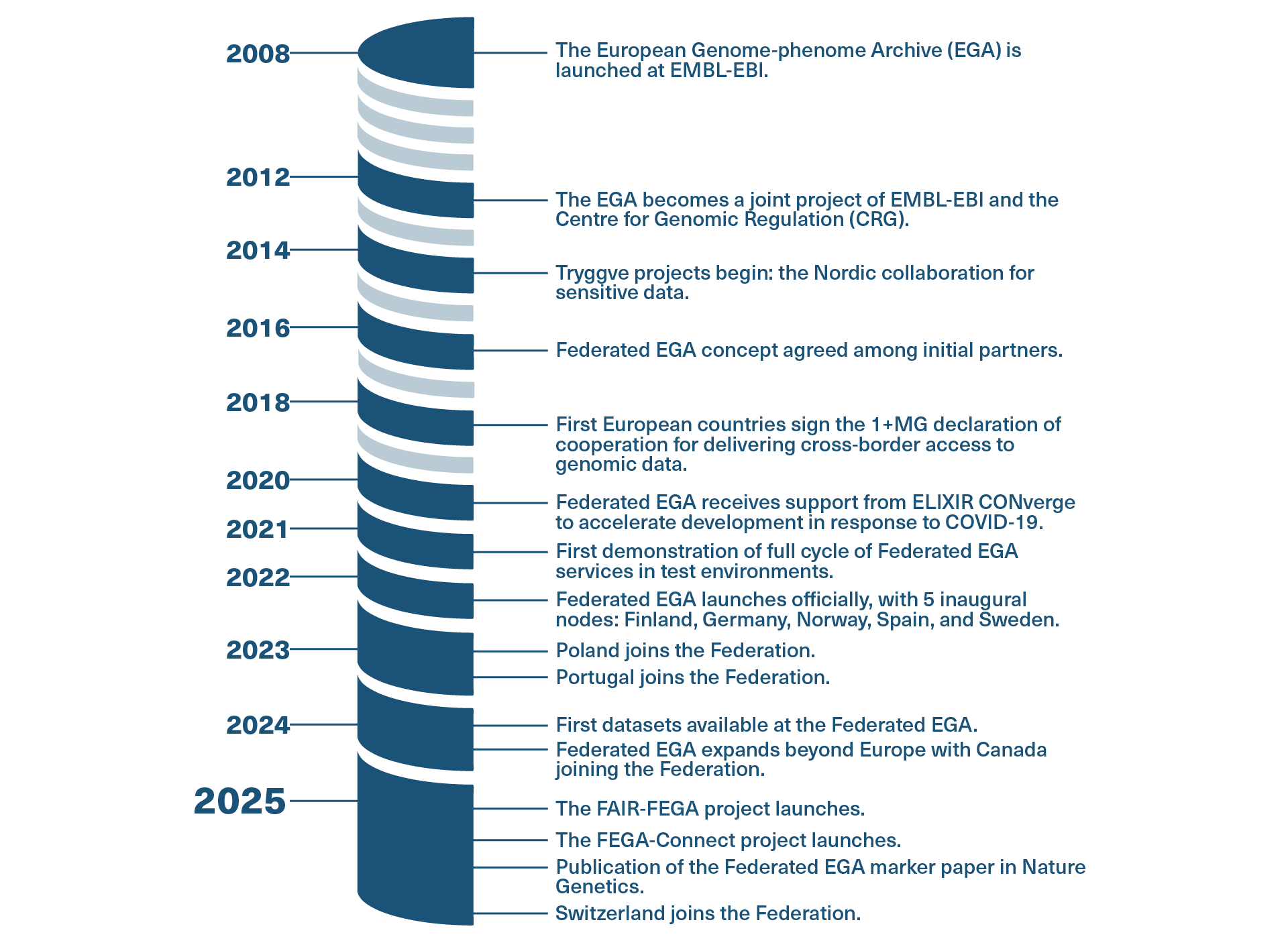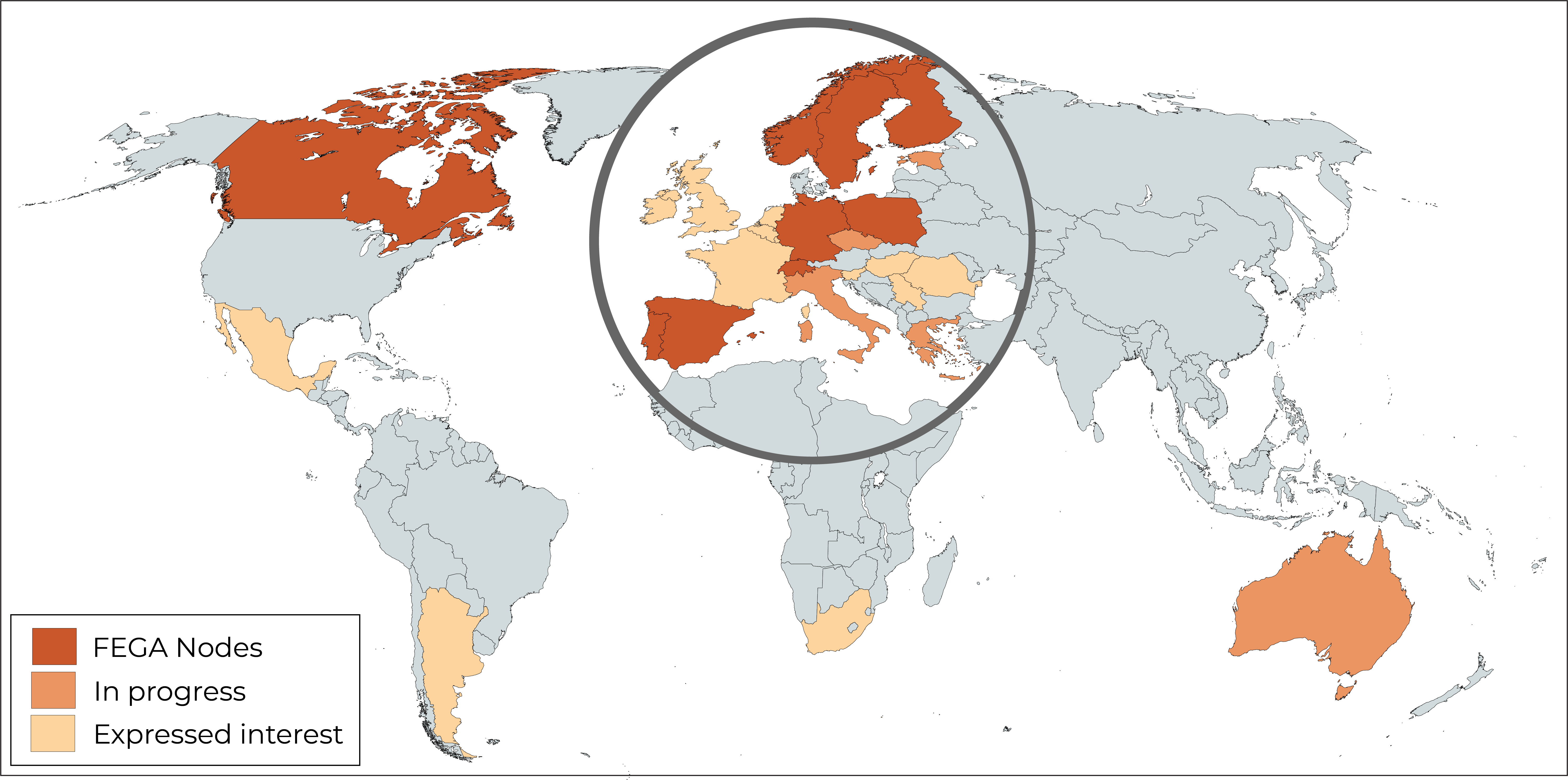Federated EGA
Overview
Federated EGA is a global network of repositories enabling secure discovery and access to sensitive human data.
Our vision is to accelerate scientific discovery and healthcare breakthroughs by creating the go-to worldwide sensitive human data resource.
Our values are:
- Privacy & Trust: Ensuring privacy of data subjects, security of services and acting with integrity to build community trust.
- FAIRness: Driving reuse of data through standardisation of metadata and clear access policies.
- Diversity: Expanding our network and representing global diversity in the data we host to bring benefits worldwide.

Federated EGA - European by name, global by nature
Federated EGA collaborates with European and global initiatives (GA4GH, ELIXIR, 1+ Million Genomes Framework, GDI), demonstrating that a network for transnational discovery of and access to human data is possible. By providing a solution to emerging challenges around secure and efficient management of human omics and associated data, the FEGA Network fosters data reuse, enables reproducibility, and accelerates biomedical research.
For general enquiries or to request more information about Federated EGA, please reach out to us here.
Read more about the Federated EGA in our commentary in Nature Genetics!
Learn more about setting up a Federated EGA Node in our onboarding documentation.
Map of FEGA status across the world

Current status of the FEGA Network
| Node | Description | Joined |
|---|---|---|
| CEGA | Central EGA is managed by the Centre for Genomic Regulation (CRG) and EMBL-EBI. The EGA has been a trusted repository for sensitive data since 2008. CEGA coordinates the FEGA network, hosts central services and the EGA catalogue. | 2022 |
| Finland | FEGA Finland is hosted by CSC - IT Center for Science Ltd., which is the national ELIXIR Node in Finland. CSC is a state-owned company specialising in providing high-quality IT infrastructure and services for Finnish higher education and research. | 2022 |
| Germany | The German Human Genome-Phenome archive (GHGA) is part of the German National Research Data Infrastructure (NFDI). It is coordinated by the German Cancer Research Center (DKFZ) and includes over 20 academic partners. | 2022 |
| Norway | FEGA Norway is a service by ELIXIR Norway, the Norwegian node of the European organisation ELIXIR. University of Oslo as a partner institution in ELIXIR Norway is hosting the service relying on the TSD infrastructure for sensitive data. ELIXIR Norway is a consortium of 5 Norwegian universities and is coordinated by University of Bergen. | 2022 |
| Spain | FEGA Spain is co-hosted by the Barcelona Supercomputer Center (BSC) and the Centre for Genomic Regulation (CRG), both part of ELIXIR Spain and the Spanish National Infrastructure for Personalised Medicine associated with Science and Technology (IMPaCT). | 2022 |
| Sweden | FEGA Sweden is hosted by the National Bioinformatics Infrastructure Sweden (NBIS), which legally is part of Uppsala University. NBIS forms the bioinformatics platform at SciLifeLab and constitutes the Swedish node of the European organisation ELIXIR. | 2022 |
| Poland | FEGA Poland is hosted by Biobank Lodz, which is part of University of Lodz. Biobank Lodz is an element of the infrastructure of the Regional Digital Medicine Centers established by the Medical Research Agency. | 2022 |
| Portugal | FEGA Portugal is managed by BioData.pt, the distributed infrastructure for Life and Health data for Portugal. This entity is a non-profit association of 15 life sciences R&I organisations spread across the country, and the home of ELIXIR Node in Portugal. | 2023 |
| Canada | Canadian Genome-phenome Archive is part of the Pan Canadian Genome Library, with the mandate to allow the secure and responsible sharing and analysis of Canadian genomic information. | 2024 |
| Switzerland | Swiss FEGA is hosted by SIB Swiss Institute of Bioinformatics, which is the national ELIXIR Node in Switzerland, on behalf of the Swiss FEGA Partnership which includes 4 other key partners (ETH Zurich, Health 2030 Genome Center, Swiss Data Science Center and Switch). | 2025 |
Documentation
| Title | Version | Description |
|---|---|---|
| Mission, vision, values | ||
| Federated EGA Mission, vision, values | 1.0 | The official Mission-Vision-Values statement for FEGA, produced and formally approved by the FEGA Strategic Committee in September 2025. |
| Structure and Organisation | ||
| Federated EGA Structure and Organisation | 2.0 | The structure of the FEGA network and service expectations, responsibilities and commitments. FEGA is organised into three tiers: Central EGA, FEGA Nodes and FEGA Affiliates. |
| Strategic Committee | ||
| Federated EGA Strategic Committee | 1.1 | Terms of reference for the FEGA Strategic Committee describe the purpose and objectives of the committee, which is to provide direction and strategic planning for the FEGA network. The committee receives input from, and provides feedback for the EGA Strategic Committee. |
| Operations Committee | ||
| Federated EGA Operations Committee | 1.1 | Terms of reference for the FEGA Operations Committee describe the purpose and objectives of the committee, which is to review operational performance and coordinate technical roadmaps of FEGA Nodes and Central EGA. The committee receives advice from, and provides operational reporting to the FEGA Strategic Committee. |
| Guidelines | ||
| Node Operations guidelines | 2.1 | An overview of the operational areas which require resources in order to create a FEGA Node. The document is based on more than 15 years' experience of EMBL-EBI and CRG operating the EGA and initial expericences of the inaugural FEGA Nodes. The operational areas of responsability are in line with the FEGA Maturity Model, which guides establishment and operation of FEGA Nodes. |
| Collaboration | ||
| Federated EGA Node Collaboration Agreement | 1.3 | Nodes are welcome to make a copy of this current version of the CA to start its review with their legal teams and understand the responsibilities of joining FEGA. Nevertheless, this version (the one with a watermark) shall not be signed: the official version needs to be obtained from FEGA prior signing through its official channels. |
